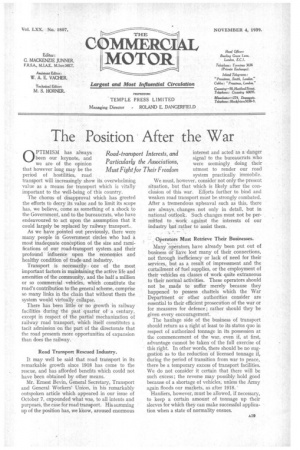The Position After the War
Page 21

If you've noticed an error in this article please click here to report it so we can fix it.
0 PTIMISM has always been our keynote, and Road-transport Interests, and we are of the opinion Particularly the Associations, that however long may be the Must Fight for Their Freedom period of hostilities, road transport will increasingly show its overwhelming value as a means for transport which is vitally important to the well-being of this country.
The chorus of disapproval which has greeted the efforts to decry its value and to limit its scope has, we believe, come as something of a shock to the Government, and to the bureaucrats, who have endeavoured to act upon the assumption that it could largely be replaced by railway transport..
As we have pointed out previously, there were many people in Government circles who had a most inadequate conception of the size and ramifications of our road-transport system and their profound influence upon the economies and healthy condition of trade and industry.
Transport is necessarily . One of the most important factors in maintaining the active life and amenities of the community, and the half a million or so commercial vehicles, which constitute the road's contribution to the general scheme, comprise so many links in the chain that without them the system would virtually collapse.• There has been little or no growth in railway facilities during the past quarter of a century, except in respect of the partial mechanization of railway road transport, which itself constitutes a tacit admission on the part of the directorate that the road presents more opportunities of expansion than does the railway.
Road Transport Rescued Industry.
It may well be said that road transport in its remarkable growth since 1918 has come to the rescue, and has afforded benefits which could not have been obtained by other means.
Mr. Ernest Bevin, General Secretary, Transport and General Workers Union, in his remarkably outspoken article which appeared in our issue of October 7, expounded what was, to all intents and purposes, the case for road transport. His summing up of the position has, we know, aroused enormous interest and acted as a danger signal to the bureaucrats who were seemingly doing their utmost to render our road system practically immobile.
We must, however, consider not only the present situation, but that which is likely after the conclusion of this war. Efforts further to bind and weaken road transport must be strongly combated. After a tremendous upheaval such as this, there are always, changes . not only in detail, but in national outlook. Such changes must not be permitted to work against the interests of our industry but rather to assist them.
Operators Must Retrieve Their Businesses.
Many ,operatora have already been put out of business Or have lost many of their connections, not through inefficiency or lack of need for their services, but as a result of impressment and the curtailment of fuel supplies, or the employment of their vehicles on classes of work quite extraneous to their normal activities. These operators should not be made to suffer merely because they happened to possess chattels which the War Department or other authorities consider are essential to their efficient prosecution of the war or for measures for defence ; rather should they be given every encouragement.
The haulage side of the business of transport should return as a right at least to its status quo in respect of authorized tonnage in its possession at the commencement of the war, even if, at first, advantage cannot be taken of the full exercise of this right. In other words, there should be no suggestion as to the reduction of licensed tonnage if, during the period of transition from war to peace, there be a temporary excess of transport facilities. We do not consider it certain that there will be such excess ; the reverse may possibly hold good because of a shortage of vehicles, unless the Army again floods our markets, as after 1918.
Hauliers, however, must be allowed, if necessary, to keep a certain amount of tonnage up their sleeves for which they can make successful application when a state of normality ensues.




























































